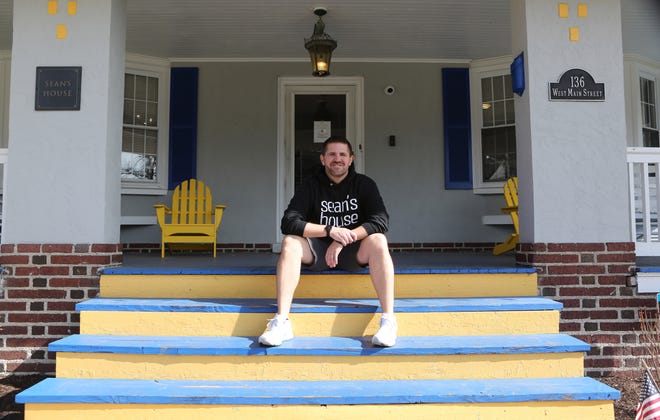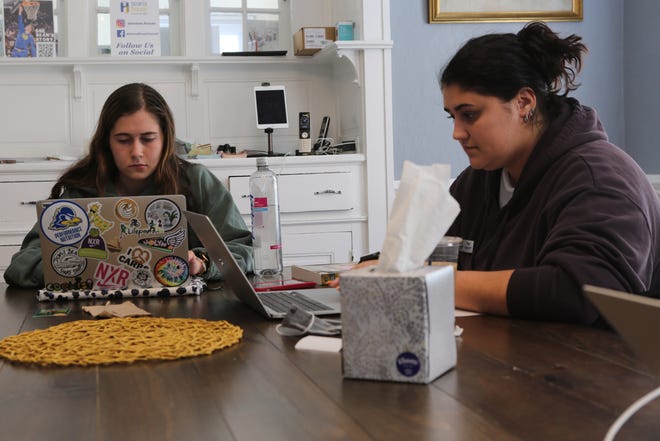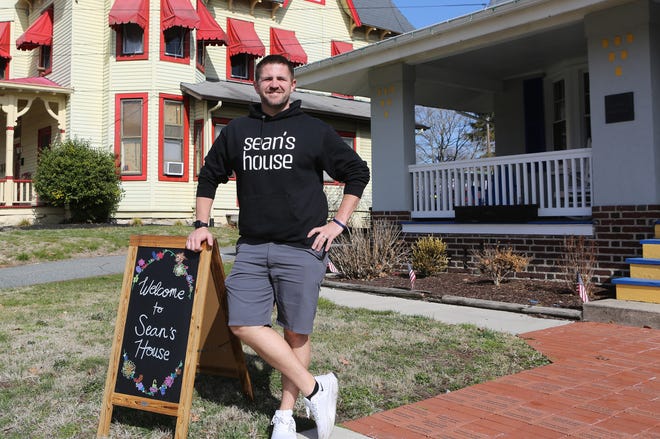Along West Main Street in Newark, a colorful chalkboard drawing beckons visitors to stop by a slate-colored house adorned with blue and gold accents.
Sean’s House, an oasis just off a campus bustling with students and the stresses of college life, offers the hope of brighter days ahead.
“The idea was to create a safe haven for young adults to have that first honest conversation about mental health,” said Chris Locke, father of Sean Locke and founder of the SL24: Unlocke the Light Foundation and Sean’s House. “We wanted to make it an enticing place. A non-clinical place.”

The house is named after Sean Locke, a former basketball player at the University of Delaware, who battled depression and died by suicide on July 18, 2018 — a few weeks before his 24th birthday.
“Sean was this loving, caring person who helped so many, but he couldn’t help himself,” said Locke.

Sean’s family created the SL24:Unlocke the Light Foundation to honor Sean with three goals in mind:
- Educating high school and college students about mental health and removing the stigma around it.
- Assisting former athletes with the transition to a life without sports.
- Creating a safe haven for youth to share their mental health journey with peers while receiving professional help.
Two months later, the idea for Sean’s House came about after Locke gave a presentation at St. Mark’s High School, formerly attended by his son.
A mother called him after his presentation and talked about needing a local place her son could go to get help while he was struggling with his mental health. Afterward, Locke decided he would create a space at his son’s former college home at 136 W. Main St.
“When someone is dealing with depression, anxiety, any sort of mental illness, it really paralyzes them from getting the help they need,” said Locke. “What we tell people is it’s a disease. You didn’t do anything to get depression or anxiety. Just like any disease, you can’t do it yourself. You have to talk to professionals.”
Sean’s house opened 17 months ago and is available to people of all ages. It offers visitors a chance to talk with the support staff, use a private room to attend therapy sessions or talk with one of the house’s trained peer mentors, among other things.
So far, Sean’s House has trained 150 peer mentors, who went through an eight-week, 60-hour training program and are equipped to deescalate high-risk situations. Peer mentors are invited to monthly dinners where they can de-stress, share their own struggles and get support from one another if needed.
The house has also created a network of outside mental health professionals so people seeking help can get an appointment with an expert within a day or two of visiting.

“Sean, when he lived there, that front door was always open. Anyone could hang out there,” said Locke.
“Sean was a great kid. He just had this big heart, and this great smile and everybody came to him when they had something to talk about. I feel like that’s his legacy.’”
It will ‘always be home’
Eight in 10 college students report high levels of stress, with 30% seeking treatment for their stress and 60% seeking help for severe levels of anxiety.
A report from Better You shows that stress, anxiety and depression are the top three mental health issues plaguing college students in recent years.
In 2020, suicide was the second leading cause of death for people ages 10-14 and 25-34.
According to the CDC, suicide is a leading cause of death in the United States, with 45, 979 deaths in 2020, or one death every 11 minutes.
In 2020, 12.2 million American adults were estimated to have seriously thought about suicide, 3.2 million planned a suicide attempt and 1.2 million attempted suicide.
For the more than 7,500 people who have visited Sean’s house, “136 will always be home,” touts the house’s motto.
Among that number are the 1,500 people who have enlisted the help of the house’s Peer24 specialists and 47 individuals dealing with suicidal thoughts who were assisted by there.

‘Walk right in’
“There’s still a stigma. It takes a lot for people to walk through that door,” said Scott Day, the house’s executive director. “That’s what it’s about, planting that seed.”
As the door hangs open, donning a sign welcoming all passersby to “walk right in,” a student in the living room hangs out on one of the cozy couches to play with Scott’s dog, Coco. A few others gather around a family-size dining table to knock out some schoolwork.
The backyard features cozy patio furniture surrounded by tiki torches, accompanied by a stone path leading to a graffiti mural of the SL24 Foundation logo. While empty at 11 a.m. on a Wednesday, the yard is usually filled with people enjoying yoga classes, playing a round of cornhole or spending time with a visiting support dog.
“It’s really just a safe haven for them to come and get what they need,” said Day. “It’s a grandma’s house feel.”
Visitors at the house can stay for a meal or grab a snack for the road, borrow a book from the property’s free library or spend an afternoon getting crafty with provided art supplies.

Sean’s House hosts several support groups , including one for survivors of suicide loss, a healthy eating program, open discussions for athletes and get-togethers for international students.
There’s also a group called “Unburden,” of high school and college students sharing their struggles in a group setting, and a new group for men discussing what they’re going through called “Man Up!” that will be hosted by Day.
“We say to students all the time, ‘you may not need us today, but you may need us three months from now, or six months from now or a year from now,’ ” Locke said. “This is your home. Sean’s house is your home.”
Sean’s house has not only reached students at the University of Delaware, but also finds visitors coming from nearby colleges including Delaware State University and Goldey-Beacom College, local high schools, and neighboring states such as Pennsylvania, Maryland and New Jersey.
‘Keep showing up’
For Day, working at Sean’s House is more than just a job. It’s a chance to teach others one of the most important lessons he has learned himself.
“I think it’s a daily reminder for me…of the power of still being here,” he said. “Every day I’m here is a reminder of why I’m still alive.”
Several years ago, he struggled to find joy in his life, feeling hopeless and a lack of purpose. His attempts at seeking help did not work, and he was less willing to continue trying.
In June of 2017, he contemplated taking his own life for the third time within a year-and-a-half after battling weight gain, marital and economic stress and self-esteem issues.
While standing on the Lee Bridge in Richmond, Virginia, thinking about jumping, Day looked down into the water and saw the faces of his children. At that moment, he finally decided to get help and prioritize his mental health.

Since then, Day has shared his mental health journey countless times with people who walk through the door of Sean’s House.
“For me, it’s not an easy button. There’s never an easy button when dealing with suicide,” he said. ”It’s not a sunshine and rainbows topic. It’s an ugly, hard topic to deal with.”
Tearing up, Day describes his kids as one of his driving factors to “keep showing up,” one of his personal mantras.
He wants his children to have both a mom and a dad around that they know will be there for them, and a safe space they can go to if they are ever struggling and need help, he said.
“My hope is that we’ve been able to be a beacon of light and hope to the people that have been here,” said Day. “They know they can at least come here to start, when they’re going through life’s difficulties.”
“It’s a home that they can come to.”
Where to find help
Sean’s House is open 24 hours a day, seven days a week, and provides a variety of mental health resources free of charge.
The doors are open from 8 a.m. to 8 p.m., but individuals experiencing mental health emergencies outside of those hours can come by for overnight help from the live-in staff and on-call support.
Sean’s House can be reached online using the “contact us” page on their website or by sending them a message on Instagram.
More resources:
- The National Suicide Prevention Lifeline can be reached at 1-800-273-8255.
- Delaware’s 24/7 youth crisis hotline can be reached at 1-800-969-HELP (4357) or by texting “DE” to 741741.
- Delaware’s Mobile Crisis Intervention Services are available in northern and southern parts of the state, and assist with issues related to depression, suicide, interpersonal conflict, substance abuse and grief. The northern hotline can be reached at 302-577-2484 or 800-652-2929. The southern hotline can be reached at 302-424-5550 or 800-345-6785.
